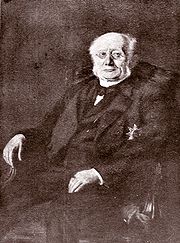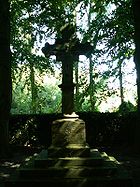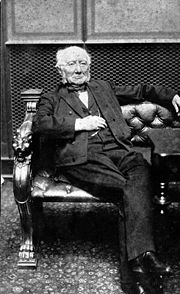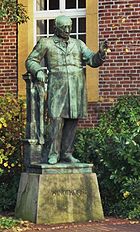
Ludwig Windthorst
Encyclopedia

Germany
Germany , officially the Federal Republic of Germany , is a federal parliamentary republic in Europe. The country consists of 16 states while the capital and largest city is Berlin. Germany covers an area of 357,021 km2 and has a largely temperate seasonal climate...
politician
Politician
A politician, political leader, or political figure is an individual who is involved in influencing public policy and decision making...
.
Biography
Windthorst was born at KaldenhofOstercappeln
Ostercappeln is a municipality in the district of Osnabrück, in Lower Saxony, Germany. It is situated in the Wiehengebirge, approx. 15 km northeast of Osnabrück....
, a country house near Osnabrück
Osnabrück
Osnabrück is a city in Lower Saxony, Germany, some 80 km NNE of Dortmund, 45 km NE of Münster, and some 100 km due west of Hanover. It lies in a valley penned between the Wiehen Hills and the northern tip of the Teutoburg Forest...
in the Kingdom of Hanover
Kingdom of Hanover
The Kingdom of Hanover was established in October 1814 by the Congress of Vienna, with the restoration of George III to his Hanoverian territories after the Napoleonic era. It succeeded the former Electorate of Brunswick-Lüneburg , and joined with 38 other sovereign states in the German...
. He was raised by a Roman Catholic family, which for some generations had held important posts in the Hanoverian civil service. He was educated at the Carolinum, an endowed school at Osnabrück, and studied at the universities of Göttingen
Göttingen
Göttingen is a university town in Lower Saxony, Germany. It is the capital of the district of Göttingen. The Leine river runs through the town. In 2006 the population was 129,686.-General information:...
and Heidelberg
Heidelberg
-Early history:Between 600,000 and 200,000 years ago, "Heidelberg Man" died at nearby Mauer. His jaw bone was discovered in 1907; with scientific dating, his remains were determined to be the earliest evidence of human life in Europe. In the 5th century BC, a Celtic fortress of refuge and place of...
.

Celle
Celle is a town and capital of the district of Celle, in Lower Saxony, Germany. The town is situated on the banks of the River Aller, a tributary of the Weser and has a population of about 71,000...
. In the next year, the revolution opened for him—as for so many of his contemporaries—the way to public life, and he was elected representative for his native district in the second chamber of the reformed Hanoverian parliament. He belonged to what was called the Great German party, and opposed the project of reconstituting Germany
German Confederation
The German Confederation was the loose association of Central European states created by the Congress of Vienna in 1815 to coordinate the economies of separate German-speaking countries. It acted as a buffer between the powerful states of Austria and Prussia...
under the leadership of the Kingdom of Prussia
Kingdom of Prussia
The Kingdom of Prussia was a German kingdom from 1701 to 1918. Until the defeat of Germany in World War I, it comprised almost two-thirds of the area of the German Empire...
. He defended the government against the liberal and democratic opposition; and, at this time, he began his struggle against the secularization of schools, which continued throughout his life.

Austro-Prussian War
The Austro-Prussian War was a war fought in 1866 between the German Confederation under the leadership of the Austrian Empire and its German allies on one side and the Kingdom of Prussia with its German allies and Italy on the...
; contrary to the opinion of many of his friends, after the annexation of Hanover by Prussia, he accepted the fait accompli, took the oath of allegiance, and was elected a member both of the Prussian parliament and of the North German diet
Diet (assembly)
In politics, a diet is a formal deliberative assembly. The term is mainly used historically for the Imperial Diet, the general assembly of the Imperial Estates of the Holy Roman Empire, and for the legislative bodies of certain countries.-Etymology:...
.
At Berlin, he found a wider field for his abilities. He acted as representative of his exiled king in the negotiations with the Prussian government concerning his private property, and opposed the sequestration, and for the first time was placed in a position of hostility to Otto von Bismarck
Otto von Bismarck
Otto Eduard Leopold, Prince of Bismarck, Duke of Lauenburg , simply known as Otto von Bismarck, was a Prussian-German statesman whose actions unified Germany, made it a major player in world affairs, and created a balance of power that kept Europe at peace after 1871.As Minister President of...
. He was recognized as the leader of the Hanoverians and of all those above who opposed the revolution. He took a leading part in the formation of the party of the Center
Centre Party (Germany)
The German Centre Party was a Catholic political party in Germany during the Kaiserreich and the Weimar Republic. Formed in 1870, it battled the Kulturkampf which the Prussian government launched to reduce the power of the Catholic Church...
in 1870–1871, but he did not become a member of it, for he feared that his reputation as a follower of the king of Hanover would injure the party; that is, until the leaders formally requested that he join them.

Kulturkampf
The German term refers to German policies in relation to secularity and the influence of the Roman Catholic Church, enacted from 1871 to 1878 by the Prime Minister of Prussia, Otto von Bismarck. The Kulturkampf did not extend to the other German states such as Bavaria...
.
On the background of rising anti-Semitism
Anti-Semitism
Antisemitism is suspicion of, hatred toward, or discrimination against Jews for reasons connected to their Jewish heritage. According to a 2005 U.S...
, he stood up for the Jews and enforced the expulsion of anti-Semitic members from the Center Party.
In 1887, Bismarck appealed to the Pope
Pope
The Pope is the Bishop of Rome, a position that makes him the leader of the worldwide Catholic Church . In the Catholic Church, the Pope is regarded as the successor of Saint Peter, the Apostle...
to use his authority to order the Center to support the military proposals of the government. Windthorst took the responsibility of keeping the papal instructions secret from the rest of his party and of disobeying the instructions. In a great meeting at Cologne
Cologne
Cologne is Germany's fourth-largest city , and is the largest city both in the Germany Federal State of North Rhine-Westphalia and within the Rhine-Ruhr Metropolitan Area, one of the major European metropolitan areas with more than ten million inhabitants.Cologne is located on both sides of the...
in March 1887, he defended and justified his action, and claimed for the Center full independence of action in all purely political questions. In the social reform, he supported Bismarck, and as the undisputed leader of the largest party in the Reichstag
Reichstag (German Empire)
The Reichstag was the parliament of the North German Confederation , and of the German Reich ....
, he was able to exercise influence over the action of the government after Bismarck's retirement. His relations with the emperor William II became very cordial, and in 1891 he achieved a great parliamentary triumph by defeating the School bill and compelling Gossler
Heinrich von Gossler
Heinrich Wilhelm Martin von Goßler was a Prussian General of the Infantry and Minister of War...
to resign. A few days afterwards he died, on 14 March 1891, at Berlin.
He was buried in the Marienkirche in Hanover, which had been erected from the money subscribed as a testimonial to him. His funeral was a most remarkable display of public esteem, in which nearly all the ruling princes of Germany joined, and was a striking sign of the position to which, after twenty years of incessant struggle, he had raised his party. Windthorst was undoubtedly one of the greatest of German parliamentary leaders: no one equalled him in his readiness as a debater—his defective eyesight compelling him to depend entirely upon his memory. It was his misfortune that nearly all his life was spent in opposition, and he had no opportunity of showing his abilities as an administrator. He enjoyed unbounded popularity and confidence among the German Catholics, but he was in no way an ecclesiastic: he was at first opposed to the Vatican decrees of 1870, but quickly accepted them after they had been proclaimed. He was a very agreeable companion and a thorough man of the world, singularly free from arrogance and pomposity—owing to his small stature, he was often known as "die kleine Excellenz". He married in 1839: of his three children, two died before him; his wife survived him only a few months.
Windthorst's Ausgewählte Reden were published in three volumes (Osnabrück, 1901–1902).

